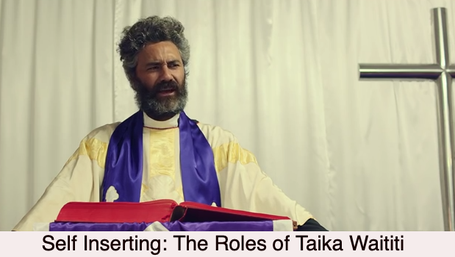Jojo Rabbit tells the story of an aspiring Hitler Youth named Jojo (Roman Griffin Davis) who has an imaginary friend named Adolf (Taika Waititi) who encourages Jojo’s ambitions to become more and more entrenched in Nazi ideology. This begins to change as he discovers and befriends a Jew in hiding named Elsa (Thomasin McKenzie). While Waititi brings a level of childish humor to the role of Adolf, using it to make fun of how blissfully full of himself he is. But what’s interesting to note about Waititi’s performance is that as Jojo’s faith in the Nazis begins to fade, the fun facade of Adolf begins to waver. He becomes more of the image we think of Hilter as, authoritative and angry, in a way that towers over Jojo. The deliberate transition between comedic and dramatic drive the idea across that Jojo is beginning to understand the problems with Nazi ideology, noteably, its hate. In doing this, Waititi’s performance is a perfect demonstration of Jojo’s arc. It's an ingenious idea to allow for an imaginary character to be used as a measure of character development. What begins as a childish idea of war and glory through a child’s eyes (shown in the first clip below) becomes a pathetic death rattle that sounds like a pathetic, abusive lover who tries to prey on insecurities and desperation in order to get what he wants. And in this depiction, he not only creates and parody and satire of Hitler, but Nazi ideology itself. By showing the petty, childish, but also intimidating aspect of Nazism, Waititi’s performance becomes a synecdoche of the entire film.
| | |
But once again, Waititi doesn’t simply make Shogun a simplistic deadbeat Dad. He has a deluded self confidence and sense of self that is both funny and sad. He’s a man who clearly lost his way after the death of his wife. He regressed into a childish persona who’s a renegade who leads a “gang” and demands his son call him Shogun. His mix of childish likeability allows us to see what Boy sees in him and how it feeds into his sense of wonder over his father. They are similar spirits, but where one is a child tasked with responsibility, Shogun is a man running away from responsibilities.
Despite Hunt for the Wilderpeople being the briefest role Waititi has held in these films, it still holds relevance for the overall themes of the film. Waititi plays a priest who speaks during a funeral for Bella (Rima Te Wiata), the woman who takes in orphan Ricky Baker (Julian Dennison). At this point in the film, juvenile delinquent and foster child Ricky Baker is taken into a new home out by the Bush in New Zealand. However, the woman who took Ricky in dies suddenly, and he is left with her husband Hector (Sam Neil) who doesn’t truly want him around. As Ricky and Hector sit in silent mourning, Waititi as the priest gives a monologue about two doors.
All of these roles point to the ideas of authority and the kind of people who tend to inhabit them. They tend to be flawed figures who often boil down to immaturity and childish displays of their authority. And these tendencies can go across multiple types of people from various walks of life, whether it be hateful tyrants, well meaning priests, or a deadbeat Dad who is struggling with grief and responsibility. Taika Waititi not only displays his talents as a director in his films, but his acting is one of the greatest tools in his arsenal. He doesn’t just have a mastery of comedy, but he can also utilize his acting to enhance the themes already present in his films.
Works Cited
Waititi, Taika, director. Boy. Amazon Prime.com / Boy, Unison Films, 2010.
Waititi, Taika, director. Hunt for the Wilderpeople. Hulu.com / Hunt for the Wilderpeople, Sony Pictures Home Entertainment, 2016.
Waititi, Taika, director. Jojo Rabbit. Fox Searchlight, 2019.


 RSS Feed
RSS Feed
